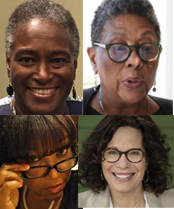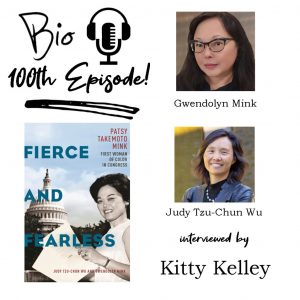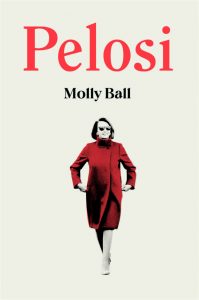At the Biographers International Organization Annual Conference this past May, I had the pleasure of moderating a panel with distinguished writers/media creators – Marilyn Nelson, Julia Sweig and Barbara Allen – who talked about their approaches to exploring life stories using poems, podcast episodes and documentary film. Information about this panel is detailed below from one of BIO’s newsletters.
The “Visual and Aural Feasts: Biography in Different Forms” panel took place on Saturday, May 14, at 11:00 a.m. It was moderated by Sonja Williams, a three-time Peabody Award-winning radio producer whose documentary productions include episodes on the “Jazz Profiles,” “Black Radio: Telling It Like It Was,” and “Wade in the Water: African American Sacred Music Traditions” shows. Williams is also a BIO Board member and the manager of BIO’s podcast. She introduced the panel by saying it was convened to offer “excellent examples of how poems, podcasts, and films can be compelling mediums for biography.”
Clockwise from top left: Sonja Williams, Marilyn Nelson, Barbara Allen, Julia Sweig

Marilyn Nelson, a poet, translator, and author, whose books include Augusta Savage: The Shape of a Sculptor’s Life, A Wreath for Emmett Till, and Carver: A Life in Poems (a National Book Award finalist, a Newbery Honor Book, and a Coretta Scott King Honor Book), spoke about the art of writing biographies using poems. Julia Sweig, author of The New York Times bestseller Lady Bird Johnson: Hiding in Plain Sight, spoke about adapting the research she conducted for the print biography into audio and film projects. And Barbara Allen, a documentary filmmaker with over a dozen Emmys to her name, shared her experiences telling life stories in film, in particular, her work creating DuSable to Obama: Chicago’s Black Metropolis.
Each of the three panelists offered samples of their work, and then Williams, as moderator, asked questions about their process. Marilyn Nelson, the former Poet Laureate of the State of Connecticut, was up first, explaining how she has used poetry to tell the life stories of Emmett Till, George Washington Carver, and more. Her most recent book is Augusta Savage: The Shape of a Sculptor’s Life, about a visual artist during the Harlem Renaissance. Nelson began by reading selections from her Carver and Savage biographies. “My book has a subtitle, The Shape of a Sculptor’s Life, because the first thing that occurred to me when the thought appeared to write about a sculptor was to try to write some poems that had the sense of being sculpted. . . . There were many challenges in that, but one of the challenges was finding enough recognizable figures to be drawn on the page.”
Williams asked her what are some of the advantages and disadvantages of writing someone’s life in poems. Nelson replied, “My poems in this case are like snapshots of one moment in a person’s life and I don’t have to write all of the filler that comes between two scenes that may be five or six years apart. I only give the two scenes that suggest the arc of movement from one scene to the other, so that’s the advantage. A disadvantage, I suppose, is if readers are wanting more and feel they need to have the intervening information. In this case, we added a detailed afterword that tells the more complete story of Augusta Savage’s life.”
Julia Sweig spoke about her experiences creating and hosting the podcast, “In Plain Sight: Lady Bird Johnson” for ABC Audio, a deal she cultivated after shopping the audio adaptation rights of her New York Times-bestselling biography of the former first lady. The podcast contains eight episodes that feature selections from Lady Bird Johnson’s audio diaries, which she donated to the National Archives. In total, Sweig had access to over 100 hours of Lady Bird Johnson speaking in her own voice, about pivotal moments during her husband’s presidency.
Just before the pandemic, Sweig sought the help of a longtime friend who had worked in film and television and had just created his own podcast startup to help her create a pitch for a Lady Bird Johnson podcast. He put together a pitch trailer and shared it with his representation at the William Morris agency. The agency’s “twenty-something podcast agent,” according to Sweig, took it around and secured five offers. The winning bidder was ABC Audio. Along with the podcast rights, ABC bought the rights to create a documentary film. Sweig explained, “We—to use a technical term—bifurcated the rights, meaning I kept the rights on scripted adaptations, but ABC has now—we’re going to see a rough cut soon—the documentary. A documentary film will come out next year directed by Dawn Porter.” Sweig emphasized that the process of selling rights to ABC taught her all about “the whole chain of command, food chain, of IP,” which starts with book rights and branches out into different media.
After introducing Barbara Allen, who goes by “B. A.,” Williams asked her why she chose the lives of the entrepreneur Jean Baptiste DuSable (1745–1818), founder of Chicago, and former president Barack Obama to frame her documentary about the city’s Black metropolis. Allen said, “The way people described him [DuSable] was the way people described Obama when he was coming out. He was quite a figure, and when you read about him, the way people described him was the way people described Obama when he was coming up: ‘He’s so intelligent. He speaks six languages. He’s everything.’ So explorers . . . and everyone would write about this guy DuSable.”
When selecting other figures who symbolized important aspects of the history of Black life in Chicago, Allen honed in on the rich Black aviation community that was founded there by Bessie Coleman in 1915, which evolved into the creation of the Tuskegee Airmen. While those aviation figures were familiar to Allen – she even admitted she found them “boring” when first considering them for inclusion, due to how familiar they were – she said she was inspired by an archivist who said, “‘It’s only boring if you think [Bessie Coleman] was alone and there was only one Black aviator by herself who did this.’” Allen said realizing there was an entire community involved in this pursuit “set me on this voyage,” and she described how she discovered the stories of Black aviators Cornelius R. Coffey (1902–1994) and John C. Robinson (1903–1954), who used their passion for and commitment to flying airplanes as a means to “symbolically practice freedom” and triumph over adversities. For example, the two learned to build, fly, and maintain their own planes despite the segregation of Chicago’s Curtiss–Wright Aeronautical University.
Allen expressed how pleased she was to find that when the young production assistants, who worked for her on the film, would throw their own watch parties, their much older relatives would attend and enjoy the documentary. She said, “I’m most happy when very older people and very young people like the work, because that means you’re hitting it correctly.”
Williams asked the panelists, “If someone wants to follow in your footsteps to do what you’ve done and write a biography in poems or do a documentary film or a podcast, what would be the first thing they should consider before attempting a project like this?”
Nelson advised would-be poet-biographers to “look for predecessors. . . . You have to set your own personal likes and desires aside and serve the person you’re writing about and not serve yourself and that’s frankly not something poets do very easily.”
Sweig responded, “What I produced is more like an audio documentary, so I say that the threshold question is: ‘What kind of archival resources exist?’ You know, if you want to tell a historical—let alone biographical—story about ‘x’ topic or person, you really need to make sure that there’s audio to tell your story. And then the second attendant question is: ‘How much does it cost and is it in the public domain?’ Because the latter would be better.” She also added the helpful hint that investing in a music supervisor elevated the quality of the audio storytelling overall, because he “helped us . . . to punctuate the story with sound and music.”
Williams followed up by asking, “What would you recommend to anybody who wants to embark on creating a podcast based on their book?”
Sweig said, “If you’re like me and you haven’t done this before, you need to have partners that know what they’re doing and you have to be willing to stick your toe in the water of the world of representation . . . having not just literary agents, but agents who can help you translate your IP into other mediums requires entering into a world of rights [for] film and television and audio.”
Barbara Allen also shared her advice to would-be biographers working on film: “Decide what your subject is and how much material there is on that subject visually. . . . Really take a deep dive into that person’s life, because you’re gonna be living with them for a long time. But if you’ve never done it [and] you’re just starting out with the idea . . . I think that a good place to start is to do a bio[pic] on someone you know—your mother, your grandmother, somebody in your family, and learn how to take that deep dive in—and because it’s someone you care about, it’ll be easier for you.”
Sweig provided the parting shot: “I don’t think one has to start with a book and then go to podcast, you could easily start with podcasts and conceive of a story you want to tell as two or three prongs—print, audio, and film—and hatch it simultaneously. Or think of . . . your research process as pulling material that is both print and audio and visual simultaneously, so that as you’re going along, if you have your subject, you’re actually developing the resource material to have a multimedia project.”
 BIO – the Biographers International Organization podcast series – just reached a milestone. Its 100th episode features an interview with the co-authors of a biography about the first woman of color congresswoman, Patsy Takemoto Mink.
BIO – the Biographers International Organization podcast series – just reached a milestone. Its 100th episode features an interview with the co-authors of a biography about the first woman of color congresswoman, Patsy Takemoto Mink.
